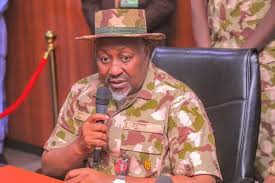Recently, Senator Ahmad Lawal, President of the Senate, constituted a ‘powerful’ 56-man committee, saddled with the responsibility of reviewing the 1999 constitution. The amendment committee comprises principal officers of both chambers of the National Assembly, a senator from each state and two other federal lawmakers to represent each of the geopolitical zones.
The reason for the review, he said, is to create a stable Nigeria that has the welfare of its citizens at heart. “As a National Assembly, particularly the Senate, we want to have a very stable country. We want a country that gives every citizen the opportunity to actualise his or her dream. We want to have security that is enhanced and an economy that works for everyone”.
This is to say, for ‘them’ the aim of the amendment exercise is to birth a new constitution or make better, already existing institutions to meet the needs and welfare of Nigerians and provide a platform for them to actualize their dreams. How true could this be?
I have taken my time to go through the 1999 constitution- which I never had time to since my media law and ethics class during my undergraduate days. I always have the perception that the constitution in its entirety was written and designed to favor the owners of the means of production.
Surprisingly, when I was glancing through the pages of this ‘supreme’ laws of the land, I was left agape with some of its provisions that slowly discredited my previously held idealistic perception. I realised that the men who penned down this constitution, really had the masses in mind, only with few biases and privileges to the benefit of the elites.
However, I would love to focus my arguments on Chapter II of the constitution of which talks on the “fundamental objectives and directive principles of state policy,” as it succinctly pointed out the fundamental obligations of the government, as well as the duties of the citizen to the country.
It is the chapter, which tersely outlined the significance of the sacred obligations of government to its citizens, and the role mass media can play in ensuring these constitutional mandates are fully provided. Painfully, the masses who are meant to enjoy these privileges, have suffered and are still suffering as a result of the maladministration of our leaders.
The first, and the most important thing, the chapter outlined is the issue of security and welfare of the people as the primary purpose of any elected government.
With the incessant killings, kidnap, banditry and terrorism in the country, there is nothing to take home regarding this clause. It is disheartening to note that Nigeria has become a slaughter slab for terrorist groups such as Boko Haram and ISWAP, who maim and kill with reckless abandon, while the government engages in a propagandistic mission to cover up its ineptitudes.
It is an irrefutable fact that government officials have hijacked the privileges of free mobility, quality education, better security, good welfare, lucrative resources, empowerment opportunities, and juicy leadership positions for their children, wives and concubines.
With all these, how do you expect the citizens to actualise their lofty ambitions and age-long dreams?
The media, on their part, has willingly helped these autocrats polarize the citizens along religious and ethnic lines. There are journalists who only engage in reporting along religious and ethnic lines, a situation that has wrecked our national unity, and threaten peaceful coexistence.
How then, would government expect the citizens to carry out their core responsibilities as explicitly enshrined in section 24(a) which states that “it shall be the duty of the citizen to abide by this constitution, respect its ideals and its institutions the National Flag, the National Pledge and legitimate authorities”?
Instead of habitually reviewing the constitution after successive general elections, it is important that our leaders fully abide by its provisions. They should not turn the amendment process into a conduit for draining huge financial resources. There is need for equitable distribution of the nation’s common patrimony, among the various class of citizens.
Doing so will help decrease the rate of internet scam, cultism, banditry, insurgency and kidnapping, among other vices holding the country to ransom. But the fact is our youths would only eschew acts with potential to compromise national interest and security when they are also offered viable opportunities, and rewarding privileges, which have remained the exclusive preserves of the ruling political class-for years. Well this time around, the nays have it!
Isah Ismaila Gagarawa is serving corps member in Abuja; [email protected]



